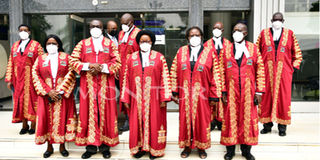Supreme Court to resume full business in December

Supreme Court justices led by Chief Justice Alfonse Owiny-Dollo (3rd left) before they sat to hear a presidential election petition filed by former presidential candidate Robert Kyagulanyi, on February 11, 2021. The Chief Justice on May 30, announced the indefinite closure of the court on grounds that it had become unsafe for habitation. PHOTO | ABUBAKER LUBOWA
The Supreme Court is expected to fully resume its operations in December, after a fire outbreak in the chambers of Chief Justice Alfonse Owiny-Dollo on April 27, prompted the closure of the court.
The registrar of the court, Ms Harriet Ssali Nalukwago, said the tenancy agreement would not be renewed since full court business will now be conducted in the new building.
“We are still following the Chief Justice’s directive to work from home. Also, we are not renewing the tenancy contract with the landlord since we are left with about two months to enter our new building,” she said by telephone at the weekend.
The registrar also dispelled rumours that the justices were not working for the last five months and that they were earning free salary.
“We continue working and many applications have been heard in this period, including judges delivering rulings/judgments. We have also held three pre-criminal sessions. It’s only the civil sessions that have not been heard,” Ms Nalukwago explained.
Records obtained from the court indicate that more than 88 pre-hearing criminal appeals conferences were held between May and July.
The statistics show that 34 cases were heard on July 12, 23 cases on May 12, and 31 cases heard on June 24.
The same court has in the same period delivered 11 judgments/ rulings in civil applications and appeals.
On May 30, the Chief Justice announced the indefinite closure of the court on grounds that it had become unsafe for habitation.
He cited water leakage that had led to the collapse of the ceiling and water flooding in the chambers of the judges, destroying property and court documents, as some of the grounds for the indefinite closure.
Most of the court business is now being conducted at the High Court building at the Judiciary headquarters.
Upon completion, the seven-storey twin appellate court building will host court sessions for both the Supreme Court and Court of Appeal. It will comprise modern courtrooms, chambers for the justices and registrars, boardrooms, a gym, restaurant, and two basement floors for parking of 226 vehicles, among other amenities.
The Judiciary will save at least Shs6b it pays annually in rent for the appellate courts.
Report on safety
A report released by the Occupational Safety and Health Inspection of the Gender ministry, stated that the same court building lacks major health and safety measures.
Some of the safety concerns include poor lighting, lack of elevators, and no access routes for people with disabilities and dysfunctional toilet door locks.
Others are lack of separation of toilets for male and female staff, moisture-related damage was observed in the ceiling and lack of emergency exits.




